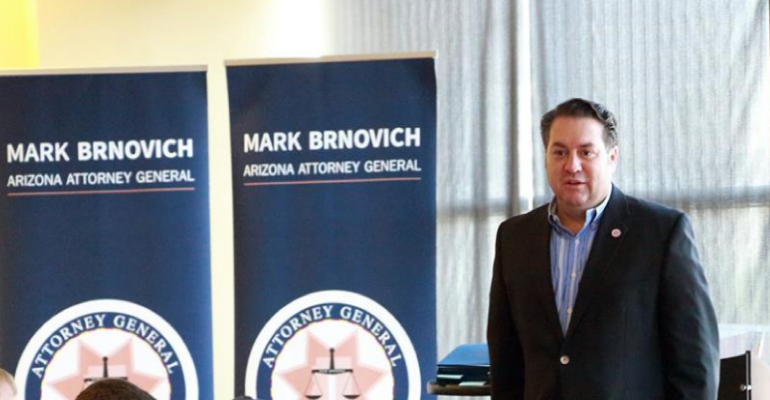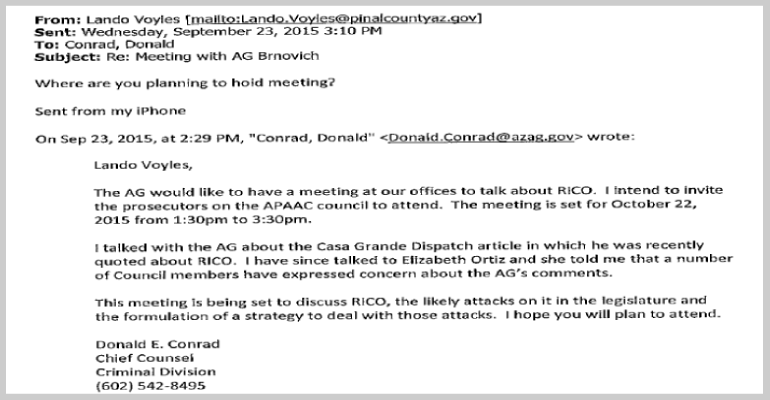
Currently a number of bills have been introduced in the State Legislature addressing the issue of civil asset forfeiture. Support for reforms spans the ideological spectrum, while opposition comes almost solely from law enforcement agencies.
For many people, the arrest of Pima County Sheriff’s Office Chief Deputy Chris Radtke brought into sharp focus the lack of oversight of law enforcement agencies and accountability for their use of money generated by criminal activity.
According to the Center for Investigative Journalism article, Profits From Policing, “Regulation of the program is inconsistent, and the reports designed to inform government officials about how and when the money is used are often missing data.”
Because of the lack of oversight and accountability, stories of the abuse of RICO by various agencies are too common.
According to the Department of Justice, the Racketeer Influenced and Corrupt Organizations (RICO) Act, allows law enforcement to remove “the tools of crime from criminal organizations” and deprive “wrongdoers of the proceeds of their crimes,” by recovering property that may be “used to compensate victims, and deter crime.” To that end, monies are to be used for law enforcement supplies and training in their efforts to specifically fight criminal organizations and/or aid victims.
Separation of powers?
Other than the Arizona Attorney General’s Office during Tom Horne’s tenure, very few law enforcement agencies focus their efforts on restitution for victims. Instead, the agencies focus on grabbing drug distribution cash. As noted in the Center for Investigative Journalism article, of the RICO monies reported, “roughly half of the money spent went to pay police salaries and cover “other operating” expenses. While advocates argue this helps police department’s deal with budget cuts, critics of the system say this creates a perverse set of incentives for both law enforcement agencies and the elected officials who set their budgets.”
That “perverse set of incentives” would make even the most ethical office struggle with competing forces. In the hands of the unethical, what was supposed to be a tool for good is turned into a rich source of self-promoting and government bloating opportunities.
Pinal County Attorney Lando Voyles and his sidekick Sheriff Paul Babeu were notorious for using RICO funds for questionable activities. So, it comes as little surprise that Don Conrad, while serving in Arizona Attorney General Mark Brnovich’s office, reached out to Voyles with regards to pesky legislators who might want to reign in RICO activities.

Conrad, at the direction of Brnovich, demanded that the AG’s staff focus only on seizing drug cash and not waste resources on the poor victims of crime. In one email to a member of the AG’s staff, Conrad was adamant that the efforts for victims initiated by Horne be halted. Shortly after demanding that the staff member “cease and desist” his efforts on behalf of victims, the staff member was relieved of duty. It was then widely understood that no resources would be wasted on victims when the AG’s office could get money for its own operations.
The fact that Conrad seemed to ignore Pinal County’s notorious abuse of RICO funds, and was more interested in coordinating efforts with Voyles against the people’s elected representatives is disturbing.
The fact that the very people, who were tasked to protect the people from those who break the law, were colluding to fight the people tasked with passing those laws, demonstrates just how perverse the system can become when in the hands of the ethically challenged.
There is a right way and a wrong way
According to sources, the AG’s seizure funds are down this year. If true, this could be due to the fact that victims have been totally forgotten by the AG’s office. Whatever the case may be, Brnovich is now asking for a $10 million increase in his budget. Upon hearing of Brnovich’s budget demand, one Capitol insider suggested giving him the extra $10 million minus whatever he takes in seized property.
No one doubts the value of RICO laws and the seizure of assets. We must question how we eliminate the perverse incentive. We must question how we deal with officials, who are convinced that they are above the law and believe that obeying it is only for the little people. We must question how we deal with officials, who are more interested in maintaining their position of power through the use of funds generated from crimes, rather than ensuring that those funds get to the victims of crime. We must question how we ensure that law enforcement officials – from the street cop to the prosecutor – do not abuse their power.
